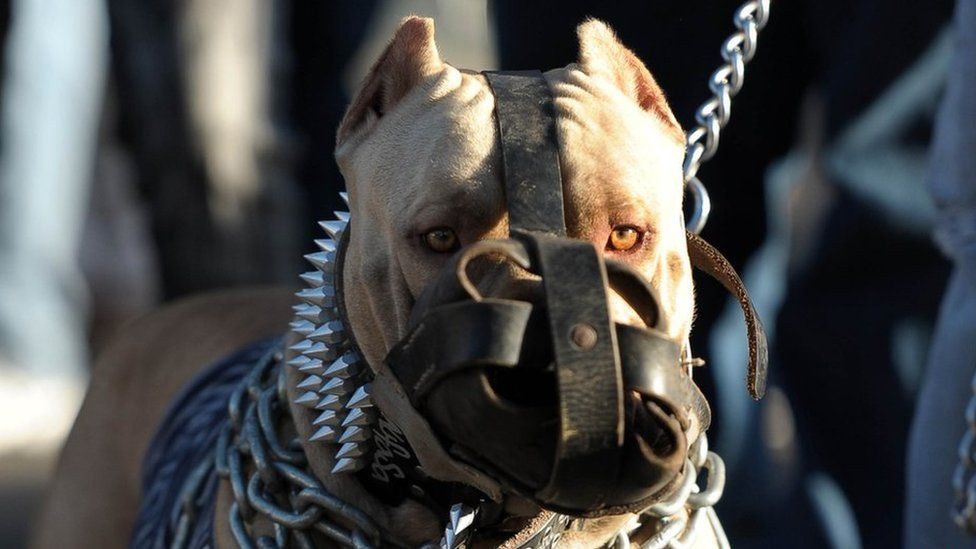Dog fighting: Campaigners call for action against owners
- Published

Campaigners want tougher penalties for dog fighting, amid concerns about its prevalence on Britain's streets among young people using dogs for protection and to uphold their status.
The League Against Cruel Sports says undercover investigators were offered dogs that could be trained to fight.
It is also calling for a register of banned owners and a review of England and Wales's Dangerous Dogs Act.
The act can be used against owners of any out-of-control dog, ministers say.
But the League argues that the legislation targets particular types of dog, rather than poor behaviour by their owners.
It wants to see the law reformed, and a specific offence of dog fighting introduced with a minimum three year custodial sentence. It is currently banned under wider animal fighting laws.
A report by the League said dog fighting had moved from organised confrontations in purpose-built pits, to so-called "rolls" in which dogs on chains fight on behalf of their owners. They are often young men keen to uphold their reputation on the street, it said.
It focused on Bedfordshire, which the charity said was representative of the problem in towns and cities.
According to the League, local people said dogs had been trained to fight in one park in Luton by hanging them from trees with their jaws to improve strength. There were also reports of fights taking place in other locations.
'Bait dogs'
Undercover investigators met a dog breeder wearing a face mask who offered Pit Bull puppies - a banned breed in the UK.
He also offered young dogs of the Bully Kutta breed - a fighting dog from Pakistan, although not a banned breed.
He said that for £1,000 he was prepared to supply dogs suitable for "protection". The Bully Kutta, he said, could be used for fighting.
The League's chief executive, Eduardo Goncalves, said the problem went beyond dogs simply fighting by chance in the street.
"This is planned, it is organised, it is deliberate," he said.
Dogs were trained to fight on treadmills, and in harnesses, with "bait" dogs used as opponents, he added.
The League showed the BBC a Staffordshire terrier, called Cupcake, which showed signs of having been used in training.
The animal's teeth had been filed back to prevent it damaging its opponent. She also had scars around the neck, and an injured eye.
"Kay", who rehabilitates abandoned dogs and is looking after Cupcake, said she was furious at those responsible.
"To victimise and torture a vulnerable creature to try to create a status or an image they want to be proud of is pretty despicable," she said.
"Man up - if you have a lust for fighting go out and fight yourself."
"Kay" is using a pseudonym because she is concerned the dog's former owner will track it down.
Animal fighting, including dog fighting, is currently banned in the UK under the Animal Welfare Act, with a maximum sentence of 51 weeks in prison. People can also be fined or banned from owning pets under the act.
Banned breeds
But an analysis of court reports by criminologists at Middlesex University last year suggested there had been fewer than 40 successful convictions linked to dog fighting under the current laws between 2008 and 2014.
Those using banned dog breeds to fight can be prosecuted under the Dangerous Dogs Act. It came into force in 1991, and bans four different breeds in England and Wales - the Pit Bull Terrier, Japanese Tosa, Dogo Argentino and Fila Brasileiro.
Owners of banned breeds, or dogs which injure or kill a person, will face tougher punishments in England and Wales from July, under new sentencing guidelines. Scotland and Northern Ireland have a system of dog control notices.
The Department of Food and Rural Affairs said: "Any dog can become dangerous if it is kept by irresponsible owners in the wrong environment which is why the [Dangerous Dogs] Act covers any type of dog that is dangerously out of control."
- Published24 February 2015
- Published17 March 2016